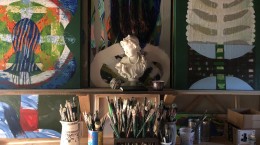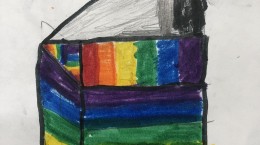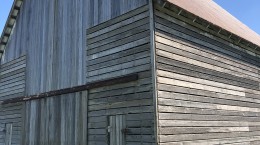Subscribe to Blog via Email
Recent Posts
Recent Comments
- Dante Ventresca (RSS) (201)
- Rebecca King (RSS) (58)
- Brad King (RSS) (19)
Authors
My Summer Executive Retreat
- 12 years ago
- 0 Comments
- stories
- community, leadership, place making, story
I don’t own a motorcycle. “I’m never going to learn how to ride a motorcycle.” This was the sentence that popped into my head while I was working on a set of designs for activating underused public spaces in Indianapolis.
Much of the work Rebecca and I do addresses the difficulties inherent in bringing people together in authentic ways. Our designs most often follow a simple line of inquiry that produces interesting and engaging conversations between strangers. Spontaneous and compelling dialogue is a hallmark of genuine human experience. Who can’t remember a particular moment when a waitress or a cab driver or the person standing in the line behind us at the grocers said something that somehow miraculously got stuck in our minds? Our job at Theater of Inclusion involves the process by which things get stuck, for the better, inside our creative existence.
It was with this approach that I was tinkering with an initial question intended as an ice breaker for a rich and complex experience to be unfolded in a public place. When we work out on the street TOI design ideas usually emerge from concepts floating around in popular culture. We begin where the opportunity for connection between strangers is greatest.
I was playing with the “bucket list” concept which refers to making a list of the things you want to do before you die. And, as is often the case with Rebecca and I, I chose to reverse the idea and see what would happen if I asked myself the question, “What am I never going to do in my lifetime?” For some, currently unknown, reason this question was far more compelling to me than the idealized fantasies that often dominate many of our bucket lists. This question had energy to it. I could feel it.
As soon as I came up with the question the answer was immediate, “I’m never going to learn how to ride a motorcycle.” All the various reasons for this converge in a very simple explanation – riding a motorcycle is inherently dangerous. I am scared of motorcycles. It’s pretty straight forward. And, of course, as I stared calmly into my thoughts about this subject it became clear to me that I would gain a great deal by doing what I knew I was never going to do.
So I signed up for ABATE’s National Safety Foundation basic course. At the designated time I showed up in a huge parking lot off Belmont and found myself amongst twenty three strangers and a crew of instructors. We worked together for three days, all day long. I learned how to ride a motorcycle. I was introduced to a set of skills that take a lifetime to master. I listened to stories that made the hair on the back of my neck stand up, stories that made me cry and laugh. I found myself talking out loud about what I didn’t understand or what I was unsure of. I was vulnerable and open and learning on a curve that was previously incomprehensible to me.
I witnessed passion in our instructors. They handled our naive attitudes with kindness and redirected our focus to the things that would save our lives out on the street. And the whole time all I could think is that this course would be a transformative experience for any working group. What team couldn’t benefit from sharing their humanness and their fear and their not having the answers? What team wouldn’t benefit from breaking their work down into specific skills that must be practiced with a passion for perfection and mastery? What kind of working language might emerge? What innovations would become obvious?
For my part, at the end of the third day, after I passed the driving and the written tests, I said good-bye to everyone and got into my car. My phone rang. I turned it off. I looked out through my windshield, the same windshield I’ve been looking through for the past ten years, and saw the world differently. I wasn’t just looking blindly and seeing only what I expected to see. Instead I was using one of the skills I had spent the weekend learning – to visually scan 12 seconds out in front of me. It was as if I had been given a new set of eyes.
It wasn’t just daylight. It was the angle of the sun and its color. It was the movement of the breeze through the trees. Each shadow mattered. Every car seemed to move in slow motion. I could see not only the drivers of the cars around me but I could see the expression on their faces and the looks in their eyes. I adjusted my speed, my direction, my decisions based on the web of information I was taking in. I’ll never be able to talk on the phone while driving again. There is too much at stake. There is too much important data life is throwing at us.
I think this is what the greatest artists try to teach us with their work. Learning how to ride a motorcycle teaches the student of life that he isn’t a passive receptor of information. An engaged person acts upon the world – not blindly but through practice, ongoing, daily practice. Getting the skills right is the starting point. This is how I spent my summer vacation. This is my report back from my executive retreat.



